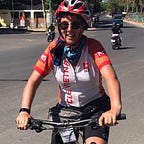D is for Disability
I don’t particularly like the word disabled. Broken down to it’s basic parts is : dis = not. able =the ability to do something. Therefore NOT ABLE.
However, I’ve come to realise it’s not so much the word I don’t like but the expectations that exist behind the word. Our society has a fascination with binary opposites. E.g. right /wrong, old/young, healthy/sick, able/disable, boy/girl.
We tend to classify people into one of the binaries, forgetting that there’s a whole pathway between the two opposites on which we all sit or walk on.
I’ve struggled to ‘own’ the title ‘disabled’ because there are parts of me that are incredibly ‘able’. There are parts of me that do not function well. And the ‘joy’ of M.S. is one is never sure one day from the next, which part will not be able to function. I resisted getting a ‘disabled parking permit’ because a) there are people more ‘disabled’ than me and b) I don’t look ‘disabled’ and the glares you get from strangers when getting out of your car looking ‘normal’ is disconcerting. But the reality is on some days, a walk around a supermarket can fatigue me to a point of barely making it to my car. So I applied for a permit. But most days I still feel ‘guilty’ using it!
The other dilemma is NDIS. They are the ultimate expression of binary thinking. I do not receive any funding. Their latest rejection was because ‘I can ride my bike’. My cycling does not earn me a living. I can ride some days for hours with very little impact on my symptoms. However, sitting in front of a computer for 30 mins can render me exhausted and give me blurred vision for the rest of the day. I need to work on a computer to earn a living. Yet in the world of polar opposites, I’m either entirely disabled or totally able.
I believe everybody has parts of themselves incredible and other parts that are imperfect. When those parts that are imperfect impact your day to day existence then ‘disabled’ can be a useful term — especially in accessing services to keep us integrated and functioning meaningfully within the wider community.
We have come leaps and bounds in my lifetime in how we treat the ‘disabled’. Yet now grappling with the term intimately, I realise how far we still have to go.
Compartmentalising may make bureaucracy function better but it certainly doesn’t help humanity function to its fullest potential. There are no easy answers but let’s start with speaking about people who have a disability and therefore need some assistance rather than a ‘disabled person’. Words matter! Because the reality is we all are imperfect and need assistance it’s just some us need a bit more to enable us to reach our greatest potential.
